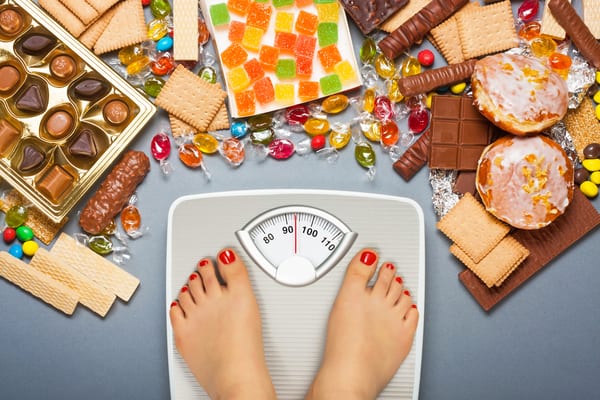As we all should know by now, diets don’t work. You may beg to differ, after all, there’s a $150 billion industry promising to “help” us lose weight, and it can feel like everyone from doctors to smartphone apps to well-meaning relatives tries to prescribe weight loss as a cure-all. But as Healthline reports, it is true, and Bentley Adams knows it. That’s why he’s the co-founder and CEO of Way Health, a mindful eating app designed to help you break the diet cycle.
“We’re asking questions to get into thoughts and emotions and feelings behind the relationship with food and behind the relationship with the body,” Adams told Healthline. Unlike some nutrition apps that co-opt the language of anti-diet frameworks while still promoting weight loss, Way Health isn’t prescriptive, according to Adams. It’s not rooted in changing your body. Rather, it’s meant to help you honor the body you have. “It’s the real anti-diet. You never step on a scale, you never count a calorie, you never track a macro,” he said. Instead, Adams said, the app challenges users to ask themselves, “If you woke up tomorrow and you can have your relationship with food be whatever you want it to be, what would it look like?”
Using Way is meant to be the first step in helping users actualize that ideal relationship with food. Folks answer several series of self-reflective questions to get to the heart of their emotions and begin unraveling how diet culture affects them — and how to start breaking free. To accomplish its goals, Way Health offers more than 60 activities across 3 pathways: Emotional Eats, Body Feels, and Mindful Shifts.
- The Emotional Eats pathway turns the traditional concept of “emotional eating” on its head. Rather than demonizing pleasurable foods, the activities in this section simply ask you to think more deeply about the role emotions play in your eating habits without moralizing them.
- Next, the Body Feels pathway asks you to consider your body image, as well as how the foods you eat and the movement you engage in may influence your mental and physical states.
- Lastly, the Mindful Shifts pathway questions the way you talk to and about yourself and others when it comes to food, exercise, and bodies. Adams said it’s meant to help you reverse the diet culture mindset that prioritizes thinness and adherence to diets.
Questions are open-ended so users can formulate responses in their own words based on their unique experiences and identities.
Clara Nosek, MS, RDN, is another Way partner and a non-diet dietitian based in Modesto, California. She said the activities are meant to help you learn to trust yourself and your ability to know what foods are right for you. “The app really works towards unraveling and unlearning those behaviors that lead to ‘health’ in terms of this aesthetic goal, as opposed to an individualized feeling of wellness and wholeness,” Nosek told Healthline.
What Way Health isn’t meant to do, though, is replace working with a non-diet RD, licensed therapist, or other professional. Instead, it helps you gauge where your relationship with food stands today and determine where you might need support. “The Way app is like a stepping-stone to opening that new space of ‘what if?’” Nosek said. “What does life look like if you’re moving your body not as punishment for what you ate last weekend but for heart health [or] the way it makes you feel?”
It’s not something you should rush through. The app is intentionally designed for exploration over time, restricting the number of sessions a user can complete in 1 day to help avoid overwhelm. Nosek recommends spending about 5 minutes per day on the activities. “One of the features that I really love is that it limits the number of interactions, so there’s really this practice of setting a boundary of ‘How much information do I really need right now?’” she said.
One of the most important differences between Way and other nutrition apps, aside from the rejection of tracking, is the consideration of enjoyment in the eating experience. Way holds space for pleasure, body diversity, and the full range of cultural foods in your eating experiences — and with a $6.99 monthly subscription price, it’s much more affordable than many popular tracking apps. According to Adams, it doesn’t take long for users to begin implementing lessons from the app into their daily lives. He said early data show that 73.5% of users report “thinking differently about how they eat” within the first week of using Way Health.
“The big differentiator between us and everything else is the feeling of a safe, nonjudgmental environment to go through self-exploration,” Adams said. “You know what your body does and does not need, and that’s ultimately how you can heal your relationship with food and with your body: by learning how to listen to it.”
—
Photo Credit: Evan Lorne / Shutterstock.com
